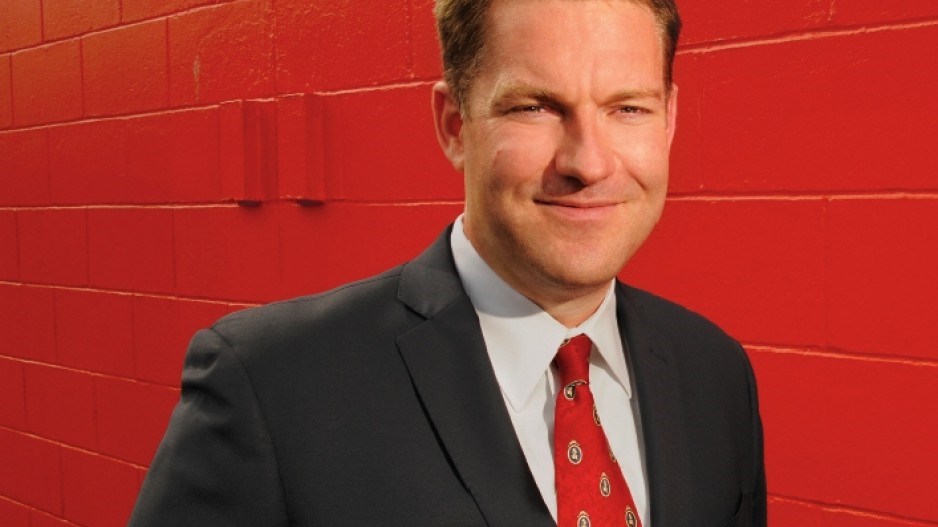As president of the Fraser Institute, Niels Veldhuis isn't aiming to win any popularity contests.
"To do what the Fraser Institute does – which is ask some very difficult questions – you get yourself put in very uncomfortable circumstances where you don't have a lot of friends and you need very thick skin," he told Business in Vancouver.
Veldhuis said that his ability to defend unpopular positions, such as critiques of Canada's immigration system, comes from his conviction in the think-tank's research methods.
"While it's controversial at times and while people don't like it at times, we can always fall back on the fact that we did our work, we did our measurements, this is what they're telling us," he said. "Now, we have to figure out a way to deal with it."
Veldhuis, who took on the role of Fraser Institute president this past spring, said his trajectory toward his current role dates back to his first college class, when he fell hard for economics.
"I got an economics teacher who just saw the world in a certain way that I hadn't been exposed to," he said. "And I said, 'This makes a lot of sense to me,' and I was hooked on economics and away I went."
Veldhuis describes economics as the study of what drives people's behaviour.
"I love studying government policy because most government policy does change the way people behave. Whether it's taxes or regulations, a lot of these things – whether the government wants them to or whether we as the public want them to – they change the way that people behave."
He adds that the discipline is firmly grounded in measurement – and, specifically, of policy outcomes. He said that regardless of ideology and political leanings, Canadians agree on certain things: health care, the environment, education and creating a better life for the next generation.
"The question is, how do you get those things?" he said. "[Economics] is about measuring what's going to give us the best health-care system, what's going to give us the lowest insurance rates, what's going to give us the best education system."
Veldhuis doesn't just like economics; he's pretty good at the discipline, according to Jason Clemens, the Fraser Institute's executive vice-president, who first recruited Veldhuis to the institute and recently returned to help Veldhuis co-lead the institute.
"Niels has a real gift for being able to see policies and then discern the unintended consequences of [government] policies," Clemens said. "Analytically, you'd be hard pressed to find a better economist than Niels."
After completing both undergraduate and master's degrees in economics, Veldhuis taught economics at Kwantlen Polytechnic University before Clemens hired him as a Fraser Institute economist in 2002. Veldhuis then juggled teaching and institute work for a number of years before opting to focus entirely on the think-tank. Veldhuis said that there's a strong link between his interest in academia and in the institute's work. Key differences, he said, are that the think-tank's findings are more applied and its audience broader. Veldhuis said policy- makers tend to follow the institute's work most closely but that the think-tank's target audience is the average Canadian.
"If there's a Canadian family and they're sitting at the dinner table and they're debating education or they're debating health care or they're debating what makes us rich and what makes us poor – those are the people I want to influence."
As his career with the institute has evolved, Veldhuis said he's moved from a pure research role into communications, and more recently into management, fundraising and strategic planning. As president, he said, fundraising now tops his task list.
"My most significant role is making sure we keep the doors open."
And Veldhuis said it's no simple task raising $9.5 million a year in a troubled economy and without a "contract research" model where donors can pick and choose which projects to support.
"It's one of these tough sales jobs in that [supporters] have to continuously be happy with what you're doing but have no influence."
Another challenge Veldhuis faces is how to transmit the institute's findings amid shifting communications norms.
"The reality is, very few Canadians are going to read an 85-page study," he said.
"They want a very condensed version, they want it quickly, they want it visually, and so we have to be at the cutting edge of that change."
Veldhuis added that he still misses the research that first got him hooked on the economics trade. "When you get to a certain level, it's certainly a trade-off that you have to decide which way you want to go. For me, I think my talents probably lie in the management and the fundraising side of things, but my first love is always research."
According to Clemens, Veldhuis has quickly been proving his value in his new role.
Clemens added that the institute has recently gone through a "tough period" with two presidents in fairly quick succession following the retirement of "charismatic" founding director Michael Walker.
But Clemens said Veldhuis has brought both fresh ideas and a track record of stability with the institute to his new role.
"Niels has grabbed the reins of the organization, and has … started the process of change and renewal almost immediately," Clemens said.
"I don't think you have to look far beyond that in the last four months to understand the leadership skills that he has."
Veldhuis chalks up his career success thus far to a supportive wife, key mentors and a lot of hard work. "I go into most rooms and I'm not the smartest guy, I'm not the most entrepreneurial guy, I'm not the biggest risk-taker," he said. "But you probably won't find someone who works as hard."




